Anand (2002) proposes a non-probabilistic representation of a decision problem when probabilities are absent. He uses Laplace's
Question:
Anand (2002) proposes a non-probabilistic representation of a decision problem when probabilities are absent. He uses Laplace's Principle of Insufficient Reason that assigns equal likelihoods to each state and calculates the expected outcome for each action on that basis. Please discuss briefly.
Fantastic news! We've Found the answer you've been seeking!
Step by Step Answer:
Related Book For 

Environmental And Health Risk Assessment And Management Principles And Practices
ISBN: 95813
2006th Edition
Authors: Paolo Ricci
Question Posted:





